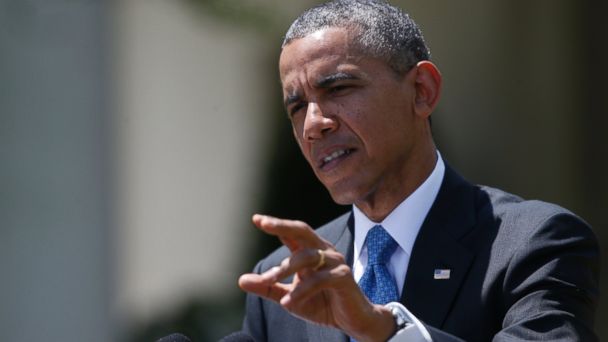Obama Suggests New Trigger for Broader Russia Sanctions

Charles Dharapak/AP Photo
When it comes to sanctions on Russia, invasion of Ukraine isn't such a clear red line, but President Obama added a fresh "trigger" to broader sanctions today when he warned Moscow that an attempt to disrupt Ukraine elections could provoke them.
Previously, administration officials have indicated that a Russian invasion of Ukraine would prompt tougher economic actions by the U.S. and its allies.
So far, the U.S. and EU have levied two rounds of sanctions, the first aimed at a handful of Russian officials, the second at a larger set of Russian officials and companies. The White House has warned that more serious sanctions are possible.
But it's been unclear what, exactly, Russia must do to trigger more sanctions. Invasion has been the clearest trigger listed yet. Russia has kept 40,000 troops on its border with Ukraine, NATO has estimated.
"For instance, should they move their troops into Ukraine across the border, we have made very clear through the G7 and with our European allies that very robust sectoral sanctions on the Russian economy could be imposed," a senior administration official told reporters on a conference call, when the last round of sanctions was imposed.
Broader sanctions would be in order "if Russia continues to escalate the situation," another administration official told reporters March 24.
Today, President Obama said broader sanctions could be levied on Russia even if it doesn't invade Ukraine, that they could be invoked if Russia seeks to disrupt the upcoming May 25 presidential election in Ukraine.
Appearing in the White House Rose Garden with German Chancellor Angela Merkel, who visited as conflict in Eastern Ukraine escalated sharply, Obama said: "[I]f in fact we see the disruptions and the destabilization continuing so severely that it impedes elections on May 25, we will not have a choice but to move forward with additional, more severe sanctions."
That trigger depends on EU willingness to cooperate. Both times Obama has pushed for sanctions, the U.S. spent weeks warning about the threat of sanctions while it communicated with European allies to rally support.
Sanctioning Russian companies or goods means that European and American companies can't do business with them, and Europe will likely see greater effects of sanctions than America. Europe consumes natural gas from Russia, and Eastern European countries have deep economic and trade ties with Russia. A sudden ban on doing business can hurt them-a fact Obama acknowledged in the Rose Garden noting that some of the 28 EU countries are more "vulnerable" to Russian retaliation than others.
Without going into many specifics, Obama acknowledged some limits to sanctions.
"The idea that you're going to turn off the tap on all Russian oil or natural gas exports I think is unrealistic. But there are a range of, you know, approaches that can be taken not only in the energy sector but in the arms sector, the finance sector, in terms of lines of credit for trade, all that have a significant impact on Russia," Obama said.